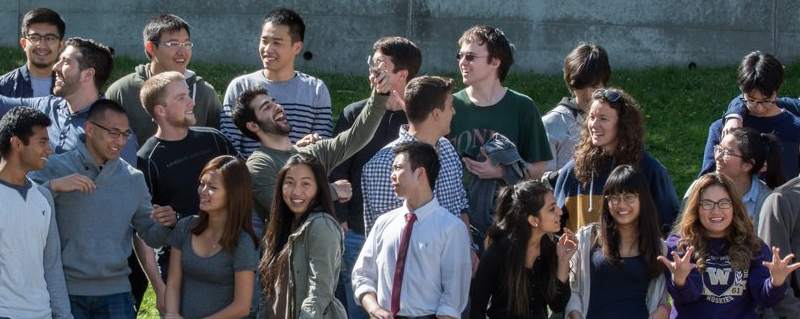At the University of Washington, diversity, equity, inclusion and belonging are integral to excellence. We value and honor diverse identities, experiences, and perspectives, strive to create accessible, welcoming, and respectful learning environments, and promote access, opportunity, and justice for all.

Faculty and staff in the Materials Science & Engineering department come from a variety of backgrounds and experiences, and encourages applications to our undergraduate and graduate programs from women, underrepresented populations, and individuals with disabilities. The following programs, organizations and resources are available to support students of diverse backgrounds.
Materials Science & Engineering Diversity, Equity and Inclusion Committee
The committee is dedicated to creating a welcoming and supportive environment for all students, faculty and staff. Do you have ideas for improving community engagement within MSE? Are you interested in taking an active role in building an equitable and inclusive environment? Students of all degree levels are welcome and encouraged to join the committee. Contact our committee chairs to become an active member.
Committee co-chairs: Eleftheria Roumeli, Navid Zobeiry
Staff representatives: Nichole Fernkes, Stephanie Love
Anyone with questions or concerns is welcome to reach out to our committee chairs or staff representatives.
Report Bias, Discrimination and Harassment
The University encourages reporting to provide support and resources, offer resolution options, stop the conduct, prevent its recurrence, and remedy its effects. If you or someone you know has experienced or becomes aware of possible discrimination, harassment, or sexual misconduct, you are encouraged to make a Civil Rights & Title IX Report.
File an incident reportCollege of Engineering programs
The College of Engineering has programs that provide financial, social, academic and cultural support to engineering students. They recruit top high school students to UW engineering who come from a variety of backgrounds and experiences.
- Disabilities Opportunities Internetworking Technology
The DO-IT (Disabilities, Opportunities, Internetworking, and Technology) Center is dedicated to empowering people with disabilities through technology and education. - Promoting Equity in Engineering Relationships
The Promoting Equity in Engineering Relationships (PEERs) program engages students to create positive change toward a more inclusive environment in the UW College of Engineering. - STate Academic RedShirt Program
The STate Academic RedShirt Program (STARS) program provides highly talented students who are eligible for financial aid with a specialized first-year curriculum designed to build learning skills and academic preparation. - Women Engineers Rise
Women Engineers Rise (WE Rise) is a program dedicated to supporting and advancing women and nonbinary students in the College of Engineering.
Student organizations
Engineering students can find opportunities for community and support within student organizations affiliated with the College of Engineering. Participation in these organizations is not restricted by race, sex or other identity.
- American Indian Science and Engineering Society (AISES)
- National Society of Black Engineers (NSBE UW)
- Society for Advancement of Chicanos/Hispanics and Native Americans in Science (SACNAS)
- Society of Asian Scientists & Engineers (SASE)
- Society of Hispanic Professional Engineers (SHPE)
- Society of Women Engineers (SWE)
University resources and support
SafeCampus
- SafeCampus is the University of Washington's violence-prevention and response program. Call SafeCampus – no matter where you work or study – to anonymously discuss safety and well-being concerns for yourself or others:
- 206-685-7233